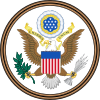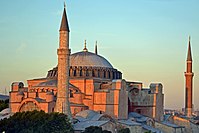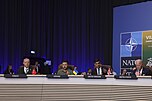Turkey–United States relations
 | |
Turkey |
United States |
|---|---|
| Diplomatic mission | |
| Embassy of Turkey, Washington, D.C. | Embassy of the United States, Ankara |
| Envoy | |
| Turkish Ambassador to the United States Sedat Önal | American Ambassador to Turkey Jeff Flake |
The Republic of Turkey (Türkiye) and the United States of America established diplomatic relations in 1927. Relations after World War II evolved from the Second Cairo Conference in December 1943 and Turkey's entrance into World War II on the side of the Allies in February 1945. Later that year, Turkey became a charter member of the United Nations. Since 1945, both countries advanced ties under liberal international order, put forward by the US, through a set of global, rule-based, structured relationships based on political, and economic liberalism. As a consequence relationships advanced under G20, OECD, Council of Europe, OSCE, WTO, the Euro-Atlantic Partnership Council, IMF, the World Bank and the Turkey in NATO. [1]
During interwar period (1918-1939), Turkey-US laid the groundwork for cooperation without a defined strategic interest.[2] The US send a Congressional delegation to emphasize trade and business, along the non-missionary philanthropy and other cultural enterprises.[2] Archaeological expeditions sponsored by American universities.[2]
During
During the Cold War (1945-1991),
Over the 2010s, Turkey has become a much more independent geopolitical player, but at the same time less predictable and does not correspond to the ideas of the United States in general about what kind of Turkey the US would like to see as a “model” for the Muslim countries of the Middle East. As the instability in the region increased, Turkey also no longer an “island of stability” for the US, but a source of new, often unexpected impulses on a regional scale.
Over the 2020s, Turkey was listed in "
Background
After 1780, the United States began relations with North African countries and the Ottoman Empire.[7] In the early 1800s, the US fought the Barbary Wars against the Barbary states, which were under Ottoman suzerainty. The Ottomans severed diplomatic relations with the United States on April 20, 1917, after the United States declared war against Germany on April 4, 1917, due to the Ottoman–German alliance. Normal diplomatic relations were re-established with the Ottoman Empire's successor state, Turkey, in 1927.[8]
The strategic partnership characterized the exceptionally close economic and military relations between 1952 and the 2010s. The 2010s were a period of deterioration over the US policies in Syria. In 2020, Turkey was added to CAATSA, and the partnership worsened from ambivalent allies of the 2010s to antagonists.[9]
Strategic partnership during Cold War (1946–91)
From 1952 to 1991, the relationship premised on a “mutuality of benefits”.
| United States | Turkey |
|---|---|
|
|
After participating with United Nations forces in the
Turkey was one of the founding members of Central Treaty Organization (CENTO), which promoted shared political and military economic goals similar to and modeled like NATO. The US pressured and promised military and economic aid to be the founding member. The US was not a member. The defensive organization never became functional partly due to the lack of leadership as John Foster Dulles (United States Secretary of State) claimed that the administration could not obtain Congressional approval."[12]
The US actively supported Turkey's membership bid to join the European Union and frequently lobbied on behalf of Ankara through its diplomatic missions in EU capital cities.
Strategic partnership during War on Terror
In 2001, the relationship began with the premise of the United States fostering cooperation on counterterrorism, law enforcement, and military training and education.[13] Turkey remained a close ally of the United States and provided support in the War on Terror.
| Turkey | United States |
|---|---|
| Goal: Territorial Integrity | Goal: Achieve stability and a reduced threat of terrorism from Iraq and Afghanistan |
|
|

In 2013, the US and Turkey created a $200 million fund to help stem extremism by undercutting the ideological and recruiting appeal of jihadists in places like Somalia, Yemen, and Pakistan.[14] It was the first global effort to support local, community-level initiatives aimed at strengthening democratic values, empathy towards the enemies and development of countering values to prevent violent extremism. When asked Kerry defined the strategic goal “It’s a different kind of challenge and we believe we need to intensify our efforts to address the underlying factors that lead down the path of violence, It’s about building foundational security, challenging the narrative of violence to refuse to justify the slaughtering of people.” [15] In short, the program was based on the role of education in preventing violent extremism and deradicalizing young people.
Deterioration of the strategic partnership
| United States | Turkey | |
|---|---|---|
| Gulf War | Chief of the Turkish General Staff, General Necip Torumtay resigned to prevent Turkey's active engagement.[16] | |
| Iraq War | The "hood event" was perceived as an act of U.S. hostility in Turkey. | Turkey denied opening of US ground front (northern front). |
Syrian Civil War
|
Armed People's Protection Units (YPG).Established an autonomous region. |
Performed Operation Olive Branch in 2018 and Operation Peace Spring in 2019 against YPG which Turkey accepts as the branch of Kurdistan Workers' Party (PKK).[17] Determined to destroy 'Terror Corridor' (autonomous region)[18] |
US Congressional Research Service (CRS) stated that "Turkey’s relative importance for U.S. policymakers declined in the immediate aftermath of the Gulf War and the collapse of the Soviet Union, but focus remained on a number of regional developments involving Turkey."[19] According to CRS a "reassessment period" established between 1991 and 2002. CRS timeline for 1991-2002 showed that the US established a "No-Fly Zone" in the north of Iraq, and later withheld military loans to Turkey on alleged human rights violations in relation to PKK in 1994.[19] In 1997, the US designated the PKK as a foreign terrorist organization and PKK's activities stopped following its leader was captured with US assistance in 1999.[19] In 2003, the Turkish parliament didn't allow the US invasion of Iraq from Turkey, and the following year PKK resumed insurgency and attacks from northern Iraq.[19]
With President Obama, we had a mutual agreement about the PKK – but Obama deceived us. I don't believe the Trump administration will do the same.[20]
Since US President

Vice president Fuat Oktay, “The United States must choose. Does it want to remain Turkey’s ally or risk our friendship by joining forces with terrorists to undermine its NATO ally’s defence against its enemies?” [26]
According to
It is evident that the Turks do not want to be sidelined by the US or the West when it comes to their own national security concerns. Neither do they want to be hamstrung by easily severed logistics. Clearly, they want to be, and have been thinking about becoming, important players in regional politics, and their public national security policy says as much. They have become involved at every opportunity in multi-national military interventions. They have shown a willingness to defy the US. They have industrial and procurement plans aimed at strategic autonomy.[32]
From strategic partnership to adversary
The situation is set to deteriorate significantly after the passage of the
In 2018, the Council on Foreign Relations recommended “US needs to develop alternatives to Incirlik Air Base. The use of the base to advance U.S. interests is no longer assured.”[9] In 2019, US and Greece signed "Revised Defense Cooperation Agreement". The agreement was described as critical to responding to new security challenges in the eastern Mediterranean Sea. In 2021, a new agreement the "Greek-American Mutual Defense Cooperation Agreement" permitted the US military to use Georgula Barracks in Greece's central province of Volos, Litochoro Training Ground, and army barracks in the northeastern port city of Alexandroupoli apart from the naval base in Souda Bay in Crete which the US has been operating since 1969.[37] In short couple years, Turkey saw shifting NATO powers to its western neighbor. Anadolu Agency reported growing US military presence in Greece can lead to undesired scenarios in the Aegean ‘Deploying more US troops to Greece would disrupt NATO’s powers,’ [38] In 2021, Biden's recognition of the Armenian genocide reflects the dispensability of Turkey-US relations, on the other hand, Biden also emphasized the relations with Armenia.[39] After Azerbaijani blocking Zangezur corridor in 2023, American Enterprise Institute scholar Michael Rubin called Biden to act,[40] and talks with Armenia to establish a military base in the Zangezur corridor.[41] While Sep 11, 2023, a small contingent of US special forces trained Armenian soldiers during the "Eagle Partner" exercise in Armenia.[42]
On October 12, 2023, President Biden declared "particularly the actions by the Government of Turkey to conduct a military offensive into northeast Syria, undermines the campaign to defeat the Islamic State of Iraq and Syria, or ISIS, endangers civilians, and further threatens to undermine the peace, security, and stability in the region". Following this declaration President Biden reestablished Executive Order 13894 which stated Turkey is an unusual and extraordinary threat to the national security and foreign policy of the United States constituted by the situation in and in relation to Syria.[43] Following the 2023 Ankara bombing, Turkish intelligence officials established that the assailants arrived from Syria by paraglider,[44] where they had been trained. Six days before the declaration, Turkey began bombing their facilities in Syria, October 2023 Northern Syria clashes.[45] CJTF–OIR downed a Turkish drone, while doing airstrikes on PKK militants around Hassakeh which came within 500 m of American troops.[46] A day before the executive order made public, Turkey declared to intensify strikes on PKK in Iraq and Syria.[47]
According to Council on Foreign Relations, the United States needs to adjust its expectations, ask for less, and develop other options because Turkey only remains formally a NATO ally but not a partner of the United States.[9] Since the deterioration of the relationship, there has been growing Turkish-Russian security cooperation.[24]
History

Truman administration (1945–1953)
One of Turkey's most important international relationships has been with the United States since the end of the Second World War and the beginning of the Cold War. [citation needed]
Soviet Union (Straits crisis, Truman Doctrine, Korean war, NATO)
In 1945,
In 1946,
in 1947, British assistance to Turkey ended. The U.S. dispatched military aid to ensure that Turkey would retain chief control of the passage. Turkey began to associate with the United States in 1947 when the United States Congress designated Turkey, under the provisions of the "Truman Doctrine", as the recipient of special economic and military assistance intended to help it resist threats from the Soviet Union.[49]
The
The U.S. sought the
Turkey's admission to NATO, in February 1952, was preceded by extensive study and debate on extending eastern Mediterranean.[49] That created the new southern flank. Changes were needed in the wording of the treaty to expand its territorial reach.[49] The admission of Turkey gave NATO a much longer land frontier with the Warsaw Pact. As well as a treaty interest in Turkey's Black Sea coast and the straits through which the Soviet Union had access to the Mediterranean.[49] At the same time, Turkey brought to the alliance its second-largest body of military manpower after that of the United States, in addition to access to sites for forward deployment and intelligence gathering.[49]
Marshall Plan (economic recovery & industrial modernization)
Since
Turkey received $111 million in economic and military aid and the U.S. sent the aircraft carrier Franklin D. Roosevelt.[citation needed] Marshall Plan intended to direct Turkey towards developments in agriculture, mining, and tourism sectors. Tractors and agricultural equipment entered the country and created a boom in production. The aid to the Turkish military went back to the US military-industrial complex. .[52]
Eisenhower administration (1953–1961)
Soviet Union (NATO, CENTO, U-2 incident)
Turkey was a founding member of the Central Treaty Organization (CENTO) collective defense pact established in 1955, and endorsed the principles of the 1957 Eisenhower Doctrine.[49] In the 1950s and 1960s, Turkey generally cooperated with other United States allies in the Middle East (Iran, Israel, and Jordan) to contain the influence of countries (Egypt, Iraq, and Syria) regarded as Soviet clients.[49] Throughout the Cold War, Turkey was the bulwark of NATO's southeastern flank and directly bordered Warsaw Pact countries.
On May 13 the Soviet Union sent complaints to Turkey, who in turn protested to the United States. Turkey acquired assurances that no U.S. aircraft would be allowed for unauthorized purposes.
Kennedy and Johnson administrations (1961–1969)
Soviet Union (Missile Crisis)
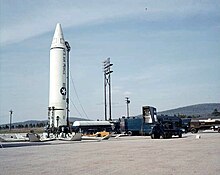
Turkey risked nuclear war on its soil during the Cuban Missile Crisis. It was a 13-day confrontation between the United States and the Soviet Union initiated by the American discovery of Soviet ballistic missile deployment in Cuba. In response to the failed Bay of Pigs Invasion of 1961 and the presence of American Jupiter ballistic missiles in Italy and Turkey, Soviet leader Nikita Khrushchev agreed to Cuba's request to place nuclear missiles on the island to deter a future invasion. An agreement was reached between John F. Kennedy and Khrushchev. Publicly, the Soviets would dismantle their offensive weapons in Cuba, in exchange for a US public declaration and agreement to avoid invading Cuba again. Secretly, the United States agreed that it would dismantle all US-built Jupiter MRBMs, which had been deployed in Turkey and Italy against the Soviet Union.[55]
In 2017, The Putin Interviews claimed that the placement of Russian missiles in Cuba was a Russian reaction to the earlier stationing of American missiles in Turkey in 1961–62; it was Khrushchev's attempt to achieve a balance of power.[56]
Greece (Cyprus, Johnson letter)
The
The Americans secretly talked to General
On June 5, 1964, President LBJ sent a letter to Turkish Premier
Washington, June 5, 1964, 12:15 a.m.
Dear Mr Prime Minister:
I am gravely concerned by the information which I have had through Ambassador Hare from you and your Foreign Minister that the Turkish Government is contemplating a decision to intervene by military force to occupy a portion of Cyprus. I wish to emphasize, in the fullest friendship and frankness, that I do not consider that such a course of action by Turkey, fraught with such far-reaching consequences, is consistent with the commitment of your Government to consult fully in advance with us. ... (1) NATO Allies have not had a chance to consider whether they have an obligation to protect Turkey. ... (2) your Government is required to obtain United States consent for the use of military assistance for purposes other than those for which such assistance was furnished. ... I do feel that you and I carry a very heavy responsibility for the general peace and for the possibilities of a sane and peaceful resolution of the Cyprus problem. I ask you, therefore, to delay any decisions which you and your colleagues might have in mind until you and I have had the fullest and frankest consultation.Sincerely, Lyndon B. Johnson
— Lyndon B. Johnson, President Johnson's letter to Prime Minister Inonu, The letter was released by the White House in January 1966 and printed in Middle East Journal 20 (1966), pp. 386–393.
Item 1 was the critical American position toward Turkey. Item 2 was the wake-up call. Johnson revealed to Turkey's political elite that the TAF overly depended on the US.[60] Inonu knew that he would receive a strong message. The letter leaked to the press before messenger left the building. Inonu created a reference point for the nature and intention of American policy on Turkey.[60] In the following decades, Johnson's Letter became the first level reference when an American policy regarding Turkey was analyzed.[60] The unintended consequence of the Johnson letter showed in the public debates. What would the American assistance look like, assuming the US wanted to defend Turkey?
The US ordered the Sixth Fleet to Istanbul in August 1968. Turkish public perceived the visit as a follow-up to the Jonson letter. The labor federations and the other left-wing groups protested the fleet. Those were the same groups that presented a heartfelt welcome in the late 1950s.[60]
Nixon and Ford administrations (1969–1977)
War on Drugs
The war on drugs is the policy of a global campaign to reduce the illegal drug trade in the United States. Turkey signed the Single Convention on Narcotic Drugs in 1961, ratified in 1967. In 1971, Turkey imposed a ban on opium production result of considerable USG pressure. USG granted a total of $35.7 million in support for the transitioning of 70,000 farm workers to the cultivation of new crops. The Turkish government implemented the program under pressure from farmers who claimed lost revenue and nationalists who claimed the program was imposed. During 1973 Turkish general election campaign all political parties expressed dissatisfaction. In 1974, Turkey moved to a system for licensing poppy production in which the state purchased all crops (no poppy market) and used them for legal production (no sale to private industry).[61]
Greece (Cyprus, Arms embargo)
After the
Turkey repeatedly claimed, for decades before the invasion and frequently afterward, that Cyprus was of vital strategic importance to it. Ankara defied a host of UN resolutions demanding the withdrawal of its occupying troops from the island. About 142,000 Greek Cypriots living in the north and 65,000 Turkish Cypriots living in the south, were forcibly expelled and were forbidden to return to their homes and properties. 109 Turkish villages were destroyed and 700 Turks were kept as hostages. Daily Telegraph described events as anti-Turkish pogrom.[62]
The United States imposed an arms embargo on Turkey in response and relations between the two countries suffered significantly.[63] Soviets saw the expansion of Warsaw Pact could have a chance in the region.[64]
Soviet Union (Cold War)
In the coming years, Turkey became a front as the political violence in Turkey (1976–1980) developed part of worldwide left-wing terrorism overthrowing the capitalist government of Turkey and replacing them with communist or socialist societies.
In 1969, Ambassador
NATO support manifested in the establishment of a clandestine stay-behind army, denoted the "Counter-Guerrilla", under Operation Gladio.
Carter administration (1977–1981)
The arms embargo was silently removed a few years later with the contribution of the geopolitical changes in the Middle East like the Iranian Revolution. National Security Advisor Zbigniew Brzezinski discussed with his staff a possible American invasion of Iran by using Turkish bases and territory if the Soviets decided to repeat the Afghanistan scenario in Iran, although this plan did not materialize.[65]
Reagan administration (1981–1989)
During the 1980s, relations between Turkey and the United States gradually recovered.
George H. W. Bush administration (1989–1993)
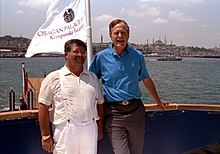
The end of the Cold War forced Turkish leaders to reassess their country's international position.
During the Gulf War, Özal modified the main principles of Turkish foreign policy towards the Middle East, which were non-interference in intra-Arab disputes and the Middle Eastern affairs. The role Turkey played during the Gulf War demonstrated to the public that it was one of the key actors in the region.[67]
Iraq (Gulf War and Northern Safe Zone)
President Özal supported the United States' position during the Gulf War (2 August 1990 – 17 January 1991). Turkey's economic ties to Iraq were extensive and their disruption hurt the country.[49] Turkey lost approximately $60 billion by closing the Kirkuk–Ceyhan Oil Pipeline during the conflict. Just before the war, Chief of the Turkish General Staff General Necip Torumtay resigned out of disagreement in involving Turkish ground forces with the conflict,[16] which prevented Turkey's active military engagement. Turkey allowed United Nations forces (UN SC Resolution 665) to fly missions from its air bases; by doing so Turkey remained a platform for the US attacks against Iraq for the rest of the conflict. Turkey played a role in the war by restraining a sizeable proportion of the Iraqi army on the Turkey–Iraq border.
After the war, Turkey continued to support major United States initiatives in the region, including the creation of a safe zone for Iraqi Kurds over northern Iraq.
NFZs also enabled a safe haven for PKK. Turkey performed cross-border operations into northern Iraq:
- Operation Northern Iraq: October 12 – November 1, 1992
- Operation Steel: March 20 – May 4, 1995
- Operation Hammer: May 12 – July 7, 1997
- Operation Dawn: September 25 – October 15, 1997
In September 1998, Masoud Barzani and Jalal Talabani signed the US-mediated Washington Agreement and established a formal peace treaty. In the agreement, the parties agreed to share revenue, share power, and deny the use of northern Iraq to the PKK.[68] President Bill Clinton signed the Iraq Liberation Act into law, providing for military assistance to Iraqi opposition groups, which included the PUK and KDP.
The United States' use of Turkish military installations during the bombing of Iraq in 1991 led to anti-war demonstrations in several Turkish cities, and sporadic attacks on United States facilities in 1992 and 1993.[49]
Clinton administration (1993–2001)
In January 1995, a consensus had emerged by among Turkey's political elite that the country's security depended on remaining a strategic ally of the United States.[49] For that reason, both the Demirel and Çiller governments made efforts to cultivate relations with the administrations of presidents George H. W. Bush and Bill Clinton.[49]
Syria (terrorism)
Syria has been on the
The Turkish government openly threatened Syria over its support for the PKK.
George W. Bush administration (2001–2009)
According to leaked diplomatic cables originating from 2004, then Prime Minister Erdoğan was described by U.S. diplomats as a "perfectionist workaholic who sincerely cares for the well-being of those around him".[72] He was also described as having "little understanding of politics beyond Ankara" and as surrounding himself with an "iron ring of sycophantic (but contemptuous) advisors". He is said to be "isolated", and that his MPs and Ministers feel "fearful of Erdogan's wrath". Diplomats state that "he relies on his charisma, instincts, and the filterings of advisors who pull conspiracy theories off the Web or are lost in neo-Ottoman Islamist fantasies".[73][74][75]
War on Terror
Turkey had remained a close ally of the United States in the
According to a report by the
Iraq (territorial integrity)
Turkey is particularly cautious about a Kurdish state arising from a destabilized Iraq. Turkey has fought an insurgent war against the PKK, which is listed as a terrorist organization internationally by
In 2002
In connection with its invasion of Iraq, the United States requested that Turkey allow 62,000 soldiers to deploy from its territory and that 9 Turkish air bases allow United States bombers to deploy.[85]: 37 Tension developed when the Turkish government agreed to the request, but parliament rejected it on March 1, 2003.[85]: 37 On 20 March 2003 following a visit by United States Secretary of State Colin Powell to Ankara, an agreement was consummated to allow the United States Air Force to use Turkish airspace.[85]: 37 Relations improved in 2009 following United States President Barack Obama's visit to Turkey.[85]: 37
On March 20, the
During the conflict, Ankara pressured the U.S. into subduing PKK training camps in northern Iraq. The U.S. remained reluctant due to northern Iraq's relative stability compared to the rest of the country. On October 17, 2007, the
Russia (Dependence on Gas and Nuclear Energy)
Turkey's fourth attempt at building a nuclear reactor, in 2002, was driven by concerns over dependence on Russian gas for electric generation. US companies did not produce any bids. In fact, Turkey received only bid—from Rosatom.[91] The bid was rejected partly due to defeating the dependency problem. Turkey's build-own-transfer approach failed.[91]
In June 2008, The United States and Turkey began to cooperate on peaceful uses of nuclear energy with a pact that aims for the transfer of technology, material, reactors, and components for nuclear research and nuclear power production in Turkey for an initial 15-year period followed by automatic renewals in five-year increments that provides a comprehensive framework for peaceful nuclear cooperation between the two nations under the agreed non-proliferation conditions and controls. A parallel US bipartisan resolution highlighted the importance of the Turkish Republic's key role in providing its Western (EU and US) and regional allies Eurasian energy security.
The Center for Strategic and International Studies started a one-year initiative project to evaluate and enhance the Turkish Republic–United States strategic partnership, aiming for a plan of implementation of the concluded framework at the end of this phase.
After 8 years of failed attempts, due to being received as a possible nuclear proliferation front in the West (US), Turkey altered its strategy. Instead of owning a nuclear power plant, Turkey enabled vendors to own the plant. In 2010, Turkey and Russia signed an agreement for nuclear cooperation.[91] From a Eurasian energy security perspective, US lost a NATO partner (in nuclear cooperation) as this nuclear deal did not solve Turkey’s dependence on Russia’s natural gas, but added a second dependence on nuclear technology.[91]
Gülen Movement (Ergenekon)
The
Gülen movement's possible involvement in the Ergenekon plot (trials) is controversial.[92] The investigation claimed to study an organization compared to Counter-Guerrilla. Accused were claimed to be the "deep state." The Ergenekon trials were a series of high-profile trials that began on October 20, 2008, in which 275 people, including military officers, journalists, and opposition lawmakers, all alleged members of Ergenekon, were accused of plotting against the Erdogan government. The trials resulted in lengthy prison sentences for most of the accused. The US Secretary of State reported on the Turkish investigation into the Ergenekon network and concluded that “the details of the case were murky, however, and Ergenekon's status as a terrorist organisation remained under debate at year's end”.[93]
Obama administration (2009–2017)
On 30 May 2009, A
Iran (nuclear deal, arms embargo, oil trading controversy)
In May 2009, after parliamentary debates in Belgium and Germany called for the removal of nuclear weapons stationed, questions were subsequently raised over the continued presence of "reportedly" stationed at the Incirlik air base as part of the NATO nuclear sharing program. Bilkent University Professor Mustafa Kibaroğlu speculates that if the Obama administration presses for the withdrawal of these weapons, which Turkey wishes to maintain, then Turkey-U.S. relations may be strained.[97] In October 2009, President Obama sent a proposal (nuclear deal framework) to Erdoğan during the heated US discussions on nuclear weapons in Turkey, however before the framework Turkish and Iranian diplomats were discussing a preliminary nuclear deal (will be named Tehran Declaration).[98] In April 2010, while Turkish and Iranian diplomats were working on a deal, Washington stepped up its efforts to impose a new round of sanctions on Iran over its nuclear program (Comprehensive Iran Sanctions, Accountability, and Divestment Act of 2010). Iran agreed to the "Tehran Declaration" after China and Russia were in accord with the prepared UN sanctions on Iran (declared as a ‘‘tactical move’’). In May 2010, non-permanent members of the Security Council Turkey and Brazil announced the "Tehran Declaration."[99] The Tehran Declaration is a fuel-swap deal. "Tehran Declaration" stipulated that medical isotopes (a humanitarian need of Iran) could be produced by 20-percent-enriched nuclear fuel which was to be provided to only one research reactor. The research reactor in question was the Tehran Research Reactor, which was supplied by the US under the Atoms for Peace program. In exchange, Tehran will transfer 1,200 kilograms of low-enriched uranium to Turkey.[100] On 17 May 2010, Brazil, Iran and Turkey signed a tri-partite Joint Declaration asserting that a nuclear fuel exchange could lead to peace.[101] The US discarded the agreement because “it did not address the continued production of uranium enriched to 20 percent inside Iranian territory.”[102]
Turkey, India, and China opposed the adoption of a new round of sanctions claiming the "Tehran Declaration" could be improved, rather than discarded.
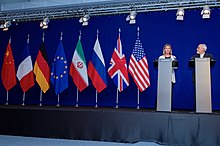
Following the discredited Tehran Declaration and sanctions on Turkey, the progress on the issue stopped until the change of government in Iran. Iranian President Hassan Rouhani signaled a change and opened the way for nuclear talks.[108] On April 2, 2015, the Iran nuclear deal framework signed five years after the Tehran Deal. Instead of Turkey-Brazil of the "Tehran Deal" the pact signed between Iran and the P5+1 countries.
We urge both sides to continue their constructive approach which aims to carry the process forward. Our hope is that both sides will carry out the mutually agreed steps on the agreement, therefore resolving this issue permanently in such a way that will satisfy all the sides involved through diplomacy.
Turkish Foreign Ministry

Why were Turkey and Brazil involved in the Iranian Nuclear issues? The Turkish Energy, Nuclear and Mineral Research Agency managed the nuclear power in Turkey. In putting together the fuel-swap deal, Turkey was trying to defend the autonomy of non-nuclear weapons states (NNWS) to enrich uranium for producing electricity and strengthen the right of NNWS to develop peaceful nuclear activities.[110] The Obama administration sanctioned Turkey albeit for different reasons than Iran. In 2013, Russian nuclear construction company Atomstroyexport and Turkey signed a construction agreement for the "Akkuyu Nuclear Power Plant". Turkey did not fall into the Iranian situation. The whole operation is Russian built, owned, and operated (
Before November 2013 US-led nuclear sanctions passed
War on Terror
The 2009
The U.S. Secretary of State's report also contained information on the
Arab Spring (Turkish model)
The U.S. under President Obama was reluctant to get deeply involved in the Arab World and was generally supportive of Turkish efforts in the region.[117]
Syrian Civil War (territorial integrity, safe zone, Rat Line, YPG)
Turkey was particularly cautious about a Kurdish state arising from a destabilized Syria. Turkey has fought an insurgent war against the PKK, which is listed as a terrorist organization internationally by a number of states and organizations. Until 2011, Turkey's policy was trying to preserve a neutral but constructive position because civil war and sectarian conflicts would threaten Turkey's security.

Between 2011 and 2012, Turkey absorbed 120,000
If we set up a no-fly zone or
United States National Security Advisor), In Syria, America Had No Good Options, The Atlantic(October 7, 2019)
Beginning in 2012, Turkey and the US supported the "
In October 2014, Vice President
In other words, this
Ahmet Davutoglu (Minister of Foreign Affairs), "From Obama to Trump: Lessons and challenges", Al Jazeera English(Feb 3 2017)
Obama used the "red line" on August 20, 2012, in relation to
Early on, Obama saw Recep Tayyip Erdoğan, the president of Turkey, as the sort of moderate Muslim leader who would bridge the divide between East and West—but Obama now considers him a failure and an authoritarian, one who refuses to use his enormous army to bring stability to Syria.[136]
— Jeffrey Goldberg, "The Obama Doctorine: The U.S. president talks through his hardest decisions about America’s role in the world.", The Atlantic (April 2016)
Turkey-US relations began showing signs of deterioration, particularly over the handling of the YPG.
According to General
In summary, during the Obama years, Turkey developed its policy towards Syria in two stages. The first stage was by itself. The second stage was with the US, which was unsuccessful. However, during obama years, Turkey was unwilling to act unilaterally toward Syria.[145]
- Tried to persuade Assad to reform. Cut the diplomatic ties. Supported regional and international political solutions. Support and aid Syria’s political and armed opposition.
- Asked Obama in support of direct military intervention, such as a no-fly zone or humanitarian corridor for the refugees. (Obama administration rejected)
Obama administration did not respond to the idea that Rojava conflict, which the Obama administration associated itself with, provided a launch pad for Turkish Kurdish separatists toward Turkey and might raise questions about Turkey’s territorial integrity.[146]
Palastine (Davos incident - Gaza flotilla raid)
“





































